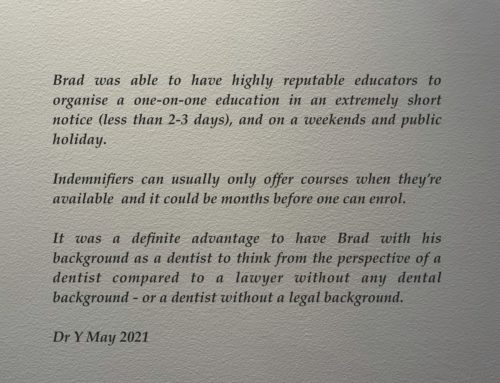Often supervision seems open-ended. Dentists and supervisors often do not understand that the supervision is not intended to be purely educative but is to satisfy the regulator that the practitioner has practised under appropriate supervision and that at the end of a period of time the supervisor is satisfied that the practitioners practice that is supervised is safe.
Of course this can take months if not years in some circumstances depending on the type of practice that is supervised.
“I had some unreasonable conditions imposed on my dental practice that meant I could not get work. I was in a practice where someone did the wrong thing but dragged me down with them. I was collateral damage.
My indemnity insurer went through the motions, but they really were not that interested. It was looking like I would have a long period of no income and no real way to advance my career. A friend referred me to Brad. He promptly filed an appeal and we negotiated a reasonable outcome with the regulator so I could get a job and get back to work. If Brad had not been there to step in, I am not sure I could have stayed in the profession.”
There is no point in writing to the regulator or asking for review until such time as a satisfactory report from the supervisor is available and has been considered.
Sometimes supervisors need assistance with drafting correspondence to address the issues of the complaint and the reason for the imposition of those conditions which is usually contained within the reasons provided to the registrant at the time of the imposition of conditions.
Factors that might lead to an early ending of supervision would include:
1. The practice area of supervision,
2. The insight and awareness and compliance of the registrant, and
3. The number of clinical cases that are treated by the registrant during a period of supervision over a period of time.
If the area of supervision is quite narrow such as a field such as endodontics or or perhaps oral surgery or implants than a shorter period of time may be acceptable to the supervisor and the regulator.
If on the other hand the area of supervision is quite wide and that practice is a significant part of the registrants practice than a longer period of time may be necessary to satisfy the supervisor and the regulator that practice is now safe and the conditions can be modified if not removed.
If the registrant shows that they have modified their practice to understand the importance of patient safety and has had an appropriate level of discussion and interaction with supervisor and have demonstrated insight into the supervision process and the need for supervision than they are more likely to have the conditions removed more promptly than otherwise.
Unfortunately sometimes registrants have a crisis of confidence understandably and do not treat a significant number of patients during a period of supervision. This is not necessarily problematic but needs to be addressed in any application to the regulator to remove or modify the conditions whether it be in New South Wales or other states.
This process can be expensive and prolonged if the application for review is not approached with care and attention to the reasons for the decision to impose the conditions of supervision.
If you are supervised and need assistance with managing or seeking an end to supervision, call 07 3007 1777 for an initial free no obligation discussion or for prompt experienced assistance.





